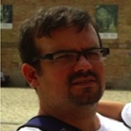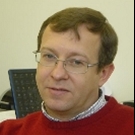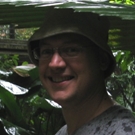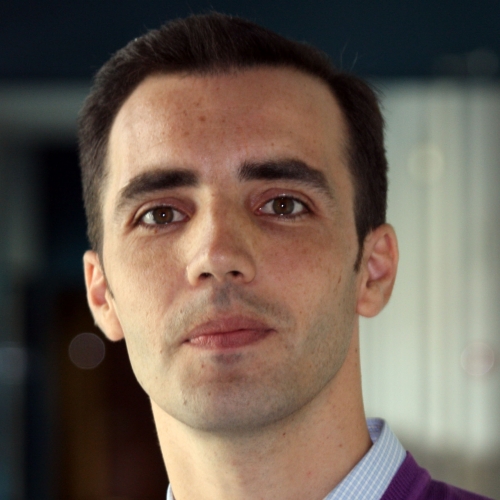Lecturers
Probabilistic Planning - Abstract - Interests
Slides 1, Slides 2

|
Blai BonetBlai Bonet received a MSc degree (1996) from Universidad Simon Bolivar under the direction of Prof. Héctor Geffner, and later a PhD degree (2004) from University of California, Los Angeles under the direction of Prof. Judea Pearl and Prof. Richard Korf, both in Artificial Intelligence which is part of Computer Science. He is a Professor of Computer Science at Universidad Simon Bolivar. His research interests lie in the intersection of several disciplines including Domain-Independent Planning, Bayesian Networks, Knowledge Representation, Heuristic Search, SAT, Theory of Computation, and others. He has developed several software for different types of planning systems, and for other applications as well |
Multi-Objective Optimization and Decision Making - Abstract - Interests
Slides 1, Slides 2, Slides 3, Slides 4, Slides 5

|
Antonio Gaspar-CunhaAntónio Gaspar-Cunha received the PhD degree in Optimization and Modeling of Single Screw Extrusion from the University of Minho, Portugal, in 2000. He is currently an Assistant Professor of Polymer Processing at the University of Minho. His main areas of scientific activity are modeling of polymer extrusion based processes and Multi-objective Multidisciplinary Design and Optimization Systems (MO-MDO). His research interests include: modeling of single and twin-screw extrusion processes, optimization and design of single screw extruders, optimization and design of twinscrew extruders, optimization of the plasticization, injection molding cycle and final part properties, development of MO-MDO systems for the above processes, modeling of mixing in polymer processing, modeling of the solids conveying zone using discrete element method, robustness analysis, decision making in multi-objective environment and feature selection using multi-objective optimization algorithms. |
Machine Learning and Pattern Recognition - Abstract - Interests

|
Gwenn EnglebienneGwenn Englebienne received a MSc with distinction in Advanced Computer Science from the University of Manchester. In 2009 he also receives the Ph.D. degree in Computer Science from the University of Manchester, winning the Best Thesis Award. After having stayed in the industry for 3+ years, working at Scientific Atlanta (now part of Cisco), he is currently a post-doc researcher and a fellow of the Intelligent Autonomous Systems (IAS) group at the University of Amsterdam. His main research interests concern machine learning, pattern recognition, machine vision and sensor networks. He cooperated with industries and research centres, and participated in several national projects. |
Recent trends in the development of Speech Technologies and Dialog Systems - Abstract
Slides
|
David GriolDavid Griol obtained his Ph.D. degree in Computer Science from the Technical University of Valencia (Spain) in 2007. He has also a B.S. in Telecommunication Science from this University. He is currently visiting lecturer at the Department of Computer Science in the Carlos III University of Madrid (Spain). He has participated in several European and Spanish projects related to natural language processing and dialogue systems. His research activities at the Applied Artificial Intelligence Group are mostly related to the development of statistical methodologies for the design of spoken dialogue systems. His research interests include dialogue management and optimization, corpus-based methodologies, user modeling and simulation, adaptation and evaluation of spoken dialogue systems and machine learning approaches. Before starting his Ph.D. study, he worked as a network engineer in Motorola. He is a member of ISCA (International Speech Communication Association), IEEE (Institute of Electrical and Electronics Engineers), and AEPIA (Spanish Association of Artificial Intelligence). |
Cooperative Particle Swarm Optimization for Combinatorial Problems - Abstract

|
Grecia C. Lapizco-EncinasGrecia C. Lapizco-Encinas has been a Visiting Professor since January 2010 at the department of Computer Science at the Universidad Carlos III de Madrid (UC3M). She received her PhD the Computer Science Department at University of Maryland at College Park. Her research has focused on biologically-inspired techniques in artificial intelligence. In particular, she has looked at applying Swarm Intelligence - a technique based on the study of collective behavior in decentralized, self-organizing systems - to abductive diagnosis of disease from symptoms and to the prediction of protein side chain packing. |
Current trends on the application of ontologies in Information Fusion - Abstract
Slides
|
Juan Gómez-RomeroJuan Gómez-Romero received a degree in Computer Science from the University of Granada (Spain) in 2004, and a PhD in Intelligent Systems from the same university in 2008. Dr. Gómez-Romero has worked as an early stage researcher in the Approximate Reasoning and Artificial Intelligence group (ARAI) of the University of Granada, and as a post-doctoral researcher in the Applied Artificial Intelligence Group (GIAA, http://www.giaa.inf.uc3m.es) of the University Carlos III de Madrid, where he continues his work as a research fellow and visiting lecturer at the Computer Science department. He has participated in more than 10 joint research projects and has published more than 30 papers in journals and international conferences. His research interests focus on computable Knowledge Representation and Reasoning formalisms (ontologies, fuzzy ontologies) and their applications to High-Level Information Fusion. |
Combinatorial Voting and Planning - Abstract - Interests
Slides
|
Hector PalaciosHector Palacios obtained his PhD (2009) from Universitat Pompeu Fabra, under supervision of Hector Geffner, in Artificial Intelligence. His research has been mostly on Domain-Independent Planning, using techniques and ideas from Propositional Satisfiability, Knowledge Compilation and Planning itself. He got recently involved into Computational Social Choice. He is a postdoc in the Planning and Learning Group at Universidad Carlos III de Madrid. |



